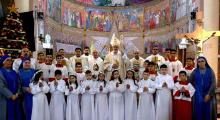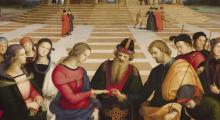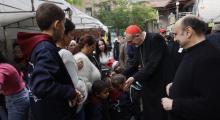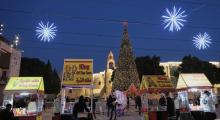Issued by the Catholic Center for Studies and Media - Jordan. Editor-in-chief Fr. Rif'at Bader - موقع أبونا abouna.org
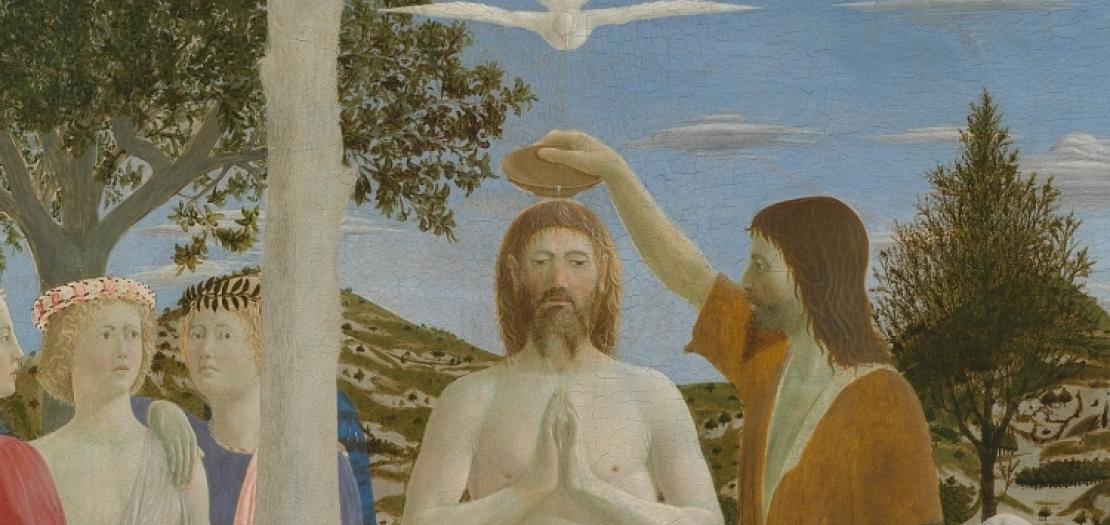
Following is the text of the meditation by Cardinal Pierbattista Pizzaballa, Latin Patriarch of Jerusalem, marking the Baptism of the Lord, dated January 12, 2025:
The feast of the Epiphany, which we recently celebrated, tells us something fundamental about our faith.
It tells us that God reveals himself, that he does not remain hidden: his mystery of love, which had remained hidden throughout the centuries, is now revealed, and revealed fully. Jesus, the Word who took on our flesh, reveals this mystery to us, reveals the face of the Father.
The entire history of salvation is permeated with small and large theophanies. Now everything is condensed in the story of Jesus: when we look at Him we see, as far as we can, the face of the Father, that is, His nature, His way of being.
We saw in Epiphany that God’s way of revealing himself is paradoxical. Normally, those who want to reveal themselves show themselves. God, on the other hand, hides to reveal Himself. He does not hide to be sought after, but because charity is something that happens in secret, that is delivered without fanfare.
The feast of Baptism, which we celebrate today, confirms us in this direction.
Jesus goes down to the Jordan where John is baptizing and, hidden among all the others, he receives baptism like everyone else (“Now when all the people were baptized, and when Jesus also had been baptized and was praying, the heaven was opened” - Luke 3,21)According to Luke’s account, it really seems that no one notices anything, no one reacts, not even John the Baptist. It happens after all, what we heard in John’s Prologue: He came to his own, but his own did not recognize him. (John 1:11)
Only One sees what happens, namely the Father. Only He recognizes that the Son, by submitting to this penitential gesture, intercedes in everything for our wounded humanity.
He became aware of this and rejoiced ("and the Holy Spirit descended upon him in bodily form like a dove. And a voice came from heaven, «You are my Son, the Beloved; with you I am well pleased". ( Luke 3,22) He rejoiced because the man who had been lost since the beginning of time and whom the Father had been searching for incessantly, was now finally found. The Father finds him right here, immersed in the Jordan.
There are many meanings connected with place and that event. Here, for example, Jesus is also depicted as the new Moses, who sets out from the Jordan on the road to liberation. But today we are focusing on another aspect, which in turn is related to the place.
The Jordan is the most miserable of all rivers.
It flows below sea level and empties into the Dead Sea, in a place where, as we know, there can be no life. In the very chapter that follows the third chapter we have just read, Jesus mentions Naaman the Syrian. (Luke 4:27) Naaman is an Aramean official who has leprosy. He comes to Israel to be healed, and the prophet Elisha sends him to bathe in the Jordan seven times. (2 Kings 5:1-19) Naaman is outraged at this suggestion, for even the least known rivers of Damascus are better than all the waters of Israel, the Jordan and its miserable tributaries.
But Jesus is not ashamed to dive into this river: He plunges into the abyss of our fragile, poor humanity and brings in all the beauty of his filial life, so that the two become inseparable. Our humanity becomes the place of God's life.
We should not overlook this: By immersing himself in our humanity, Jesus transforms it, brings it to perfection, aligns it with His highest goal.
And there is a psalm, Psalm 114, that describes this change of course, this transformation well: It is a psalm that recalls the Exodus, the liberation from Egypt, which is described with symbolic and poetic images.
One such image concerns precisely the Jordan, which, when the Lord passes through it, turns back, changes its course (“Why is it, O sea, that you flee? O Jordan, that you turn back?” (Psa. 114,5) So it is: When the Lord dips into the Jordan, the Jordan changes its course. It no longer flows towards death, but returns to its source, to the One who gives it life.
The same applies to us: when the Lord dives into our lives, we are no longer on the road to death, our story is no longer a story that leads to nowhere. On the contrary, we move towards our Principle, and gradually become more and more alive to the life of God himself.
Every day we are simply invited to join this movement, to take part in this journey, to return to the source, to that which makes us truly live.
+ Pierbattista


